| Editor's Note Rosh Hashanah begins this year on Sunday evening, September 16, and continues through nightfall of September 18. What follows is a how-to guide to the basics of Rosh Hashanah observance.
Out of respect for the sanctity of the holiday, please print out this holiday guide before the onset of the holiday (sundown Sunday, September 16), and keep handy throughout the holiday for reference purposes. The Chabad.org staff wishes you and yours a happy and healthy New Year! |
Rosh Hashanah in a Nutshell
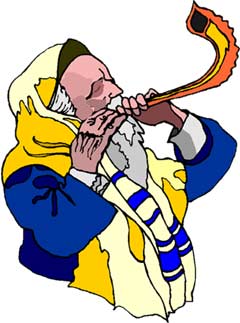 The festival of Rosh Hashanah--the name means "Head of the Year"--is observed for two days beginning on Tishrei 1, the first day of the Jewish year. It is the anniversary of the creation of Adam and Eve, the first man and woman, and their first actions toward the realization of mankind's role in G‑d's world.
The festival of Rosh Hashanah--the name means "Head of the Year"--is observed for two days beginning on Tishrei 1, the first day of the Jewish year. It is the anniversary of the creation of Adam and Eve, the first man and woman, and their first actions toward the realization of mankind's role in G‑d's world.
Rosh Hashanah thus emphasizes the special relationship between G‑d and humanity: our dependence upon G‑d as our creator and sustainer, and G‑d's dependence upon us as the ones who make His presence known and felt in His world. Each year on Rosh Hashanah, "all inhabitants of the world pass before G‑d like a flock of sheep," and it is decreed in the heavenly court, "who shall live, and who shall die... who shall be impoverished, and who shall be enriched; who shall fall and who shall rise." But this is also the day we proclaim G‑d King of the Universe. The Kabbalists teach that the continued existence of the universe is dependent upon the renewal of the divine desire for a world when we accept G‑d's kingship each year on Rosh Hashanah.
The central observance of Rosh Hashanah is the sounding of the shofar, the ram's horn, which also represents the trumpet blast of a people's coronation of their king. The cry of the shofar is also a call to repentance; for Rosh Hashanah is also the anniversary of man's first sin and his repentance thereof, and serves as the first of the "Ten Days of Repentance" which culminate in Yom Kippur, the Day of Atonement. Altogether, we listen to 100 shofar blasts over the course of the Rosh Hashanah service.
Additional Rosh Hashanah observances include: a) Eating a piece of apple dipped in honey to symbolize our desire for a sweet year, and other special foods symbolic of the new year's blessings. b) Blessing one another with the words Leshanah tovah tikateiv veteichateim, "May you be inscribed and sealed for a good year." c) Tashlich, a special prayer said near a body of water (an ocean, river, pond, etc.) in evocation of the verse, "And You shall cast their sins into the depths of the sea." And as with every major Jewish holiday, after candlelighting and prayers we recite Kiddush and make a blessing on the Challah.
Rosh Hashanah How-To
Day Before Rosh Hashanah
Selichot

The recitation of Selichot -- a series of penitential prayers and liturgy recited daily in preparation for the Days of Awe -- reaches its climax with the recitation of the "Zechor Brit" ("Remember Your Covenant") Selichot on the day before Rosh Hashanah. (Click here for more about Selichot.)
This day's Selichot, which is slightly lengthier than the preceding days', is customarily said in the very early hours of the morning. In most synagogues, the Selichot are immediately followed by the morning prayers.
Click here for the Hebrew text of the Selichot.
| When Satan sees that we are so confident, he loses confidence in his carefully prepared case |
Shofar-less The shofar is not sounded on the day before Rosh Hashanah (as it is every day throughout the previous month of Elul), to separate between the shofar soundings of the month of Elul -- which are a minhag, or "custom" -- and the Rosh Hashanah soundings, which are a biblically ordained mitzvah.
Another reason given for not sounding the shofar on this day is in order to confuse Satan, the supernal prosecutor, as he prepares his case against us for tomorrow's Day of Judgment. The blowing of the shofar is a great weapon in our arsenal. When Satan sees that we are so confident that we will be victorious on the Day of Judgment that we don't even find it necessary any more to sound the shofar, he is utterly confounded and loses confidence in his carefully prepared case.
Annulment of Vows
After the morning prayers, it is customary to perform a ceremony known as Hatarat Nedarim ("the annulment of vows") to repeal certain vows which one has taken upon oneself so that one can begin the Day of Judgment free from the sin of unfulfilled vows.
Certain vows which one has accepted upon oneself can, legally, be repealed by a court of three people. Many communities, including Chabad, have the custom of doing so before an assembly of ten individuals. The person approaches the panel and declares that he had possibly accepted vows upon himself, but had he known that he would be unable to fulfill them, he would never have accepted them upon himself. The person is then told three times that his vows are annuled.
(In Sephardic communities, it is customary to repeal one's vows twice each year: forty days before Rosh Hashanah, on the 19th of Av; and forty days before Yom Kippur, on the 1st of Elul.)
Ask for Help
On the day before Rosh Hashanah it is customary to visit the graves of tzaddikim (righteous, saintly people) and there to pray for a sweet new year. We ask the tzaddikim to intercede On High on our behalf, and we pray to G‑d to have mercy on us in the merit of these righteous people at whose resting places we are standing.
Today, many gather en masse on this day at the resting place of the Rebbe in the Queens borough of New York City (the "Ohel"). If you can't make it there on this auspicious day, you can email or fax a note with your blessing requests which will be placed by the Ohel. Click here for instructions how to do so.
Visit a Mikvah
It is customary for men to visit a mikvah (ritual pool) on this day, to be purified before entering the High Holy Days. Speak to your rabbi to find out mikvah hours in your location.
Psalms
"If you only knew the power of verses of Psalms and their effect in the highest Heavens, you would recite them constantly. Know that the chapters of Psalms shatter all barriers, they ascend higher and still higher with no interference; they prostrate themselves in supplication before the Master of all worlds, and they effect and accomplish with kindness and compassion" -- Rabbi Menachem Mendel, 3rd Chabad Rebbe.
On the day before Rosh Hashanah, every spare moment should be spent reciting Psalms. Thus, one already enters the new year with a clean slate. The continuous Psalms recitation should continue throughout the 48 hours of Rosh Hashanah.
Rosh Hashana Eve
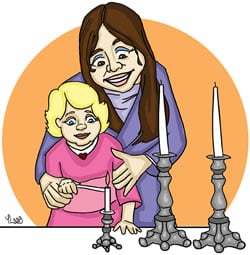
Light Holiday Candles
Girls and all women that are in the house (or if there isn't a woman in the house, the head of the household), light candles to usher in each night of the holiday, and then Shabbat. Follow this link for detailed holiday candle-lighting time information, and this link for local candle lighting times.
Candle Lighting Blessings
Blessings for September 16 and 17, 2012:
1) Ba-ruch A-tah Ado-nai E-lo-hei-nu me-lech ha-olam asher ki-deshanu be-mitzvo-tav ve-tzvi-vanu le-hadlik ner shel Yom Hazikaron.
Blessed are You, L-rd our G-d, King of the universe, who has sanctified us with His commandments and has commanded us to light the candle of the Day of Remembrance.
(Note: When reciting the following blessing on the second night of the holiday, one should have in mind the new fruit which one will subsequently be eating after Kiddush.)
2) Ba-ruch A-tah Ado-nai E-lo-hei-nu me-lech ha-olam she-heche-ya-nu ve-ki-yi-ma-nu ve-higi-a-nu liz-man ha-zeh
Blessed are You, Lord our G-d, King of the universe, who has granted us life, sustained us, and enabled us to reach this occasion.
New Year Greetings
On the first night of Rosh Hashanah, it is customary to greet one another with blessings and good wishes of Leshana tova tekatev v'etachetem -- May you be inscribed for a good year!
Click here (before the holiday) to instantly email Shana Tova greeting cards to your family and friends!
Rosh Hashanah Eve Meal
Kiddush
Before starting the Rosh Hashanah meal, we sanctify the holiday by reciting the kiddush over a cup of wine or grape juice. Click here for the text of the kiddush.
New Fruit
On the second night of Rosh Hashanah, a "new fruit," i.e., a seasonal fruit which we have not yet tasted since its season began, should be present on the table when the holiday candles are kindled and during the kiddush. While reciting the Shehecheyanu blessing after candle-lighting and after the kiddush, one should have the new fruit in mind.
This fruit is eaten following the kiddush, before washing for bread. Before partaking of the fruit we say the following blessing:
Ba-ruch a-tah Ado-nai E-lo-hei-nu me-lech ha-olam bore pri ha-etz.
Blessed are You, L-rd our G‑d, King of the universe, who creates the fruit of the tree.
Challah in Honey
Immediately following the kiddush (and on the second night, the eating of the new fruit), we perform the ritual washing for bread. After reciting the Hamotzie blessing, cut the challah, dip it in honey (some also dip it in salt), and have a bite. Pass around pieces and make sure everyone does the same.
Symbolic Foods
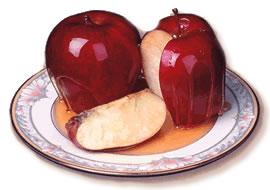
On the first night of Rosh Hashanah, after eating the challah with honey, it is customary to eat several foods which symbolize the type of year we wish to have:
We dip a piece of sweet apple into honey. Before eating it we say:
Ba-ruch a-tah Ado-nai E-lo-hei-nu me-lech ha-olam bore pri ha-etz.
Blessed are You, L-rd our G‑d, King of the universe, who creates the fruit of the tree.
Ye-hi ratzon she-ti-cha-desh alei-nu shanah tovah u-m'tu-kah.
May it be Your will to renew for us a good and sweet year.
A head of a fish, ram, or other kosher animal, is served. This symbolizes our desire to be at the "head of the class" this year.
A pomegranate is eaten, symbolizing our wish to have a year full of mitzvot and good deeds as a pomegranate is filled with luscious seeds.
Throughout the meal, it is customary to also eat foods whose names in the vernacular allude to blessing and prosperity. For example, many have the custom of eating a carrot dish, because in Yiddish the word for carrots, meren, means to multiply.
Rosh Hashanah Cuisine
On Rosh Hashanah it is customary not to eat foods which are sour or tart (the gefilte fish will have to do without the horseradish...). Instead, the focus is on sweet foods, symbolizing our desire to have a sweet year, blessings and abundance. It is also customary not to eat nuts on Rosh Hashanah, as the numerical value of the Hebrew word for nuts ("egoz") is the same as the Hebrew word for sin ("chet").
Click here for traditional Rosh Hashanah recipes.
Click here for Rosh Hashanah foods according to Sephardic custom.
Shofar-Call to Action
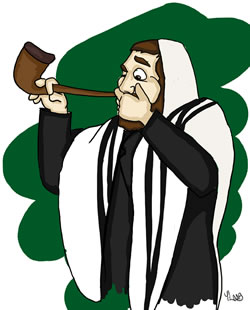
What: A shofar is a horn of a kosher animal with the marrow removed. Blow into a shofar and you get a shofar blast. Blow the right sequence of blasts at the right time of year and you've got a great mitzvah.
When: In the Bible, Rosh Hashanah is called "The Day of the Shofar Blast." That's the mitzvah of the day: to hear the blasts of the shofar. Since Rosh Hashanah is two days long, we need to hear the shofar blown during the daytime hours of both of those days (unless the first day falls on Shabbat, in which case we blow the shofar only on the second day). This year, 2012, we blow the shofar on September 17th and 18th.
Why: Basically, because it's a mitzvah. But the blasts of the shofar are also wake up calls. Rosh Hashanah is the time to shake out of our spiritual slumber, reconnect to our source, and recommit to our divine mission in this world.
Who: All Jewish men, women, and children. All of us need to reconnect.
Where: Venue of preference is your local synagogue. There, the shofar is blown after the Torah Reading. Click here to find a synagogue closest to you. No way you can make it? Contact your local Chabad rabbi. He'll do his best to arrange for a shofar blower to pay you a personal visit.
How: It may look simple, but you've got to play by the rules. Unless you know all the rules, leave it to your rabbi or another professional. Here's the basics:
The shofar blower recites two blessings and then blows a set sequence of three kinds of blasts: 1) Tekiah -- an uninterrupted blast lasting for several seconds. 2) Shevarim -- three medium length blasts. 3) Teruah -- a minimum of nine very short blasts.
Do it right and you end up with thirty such blasts on the shofar. That's the minimum requirement. In the synagogue, we blow a total of 100 blasts, with the additional blasts distributed over the course of the prayers that follow the Torah Reading.
Cast Away Your Sins - Tashlich

On the first day of Rosh Hashanah, after the afternoon prayer, we go to a lake, river or sea (preferably a body of water that has fish), and recite the Tashlich prayers, wherein we symbolically cast our sins into the water and leave our old shortcomings behind us, thus starting the new year with a clean slate.
If one is unable to perform this ceremony on Rosh Hashanah, one may do so until the last day of Sukkot (this year, October 19, 2011).
Click here to find a Tashlich service near you.
Text of Tashlich (Hebrew)
Text of Tashlich (English)
Click here for more about Tashlich, including many reasons for this ancient ritual.
Rosh Hashanah Services at a Glance
Evening Service
The evening services of both nights of Rosh Hashanah are relatively brief; in most synagogues they don't last longer than half an hour. The service starts with the Barchu, and continues with the Shema and the blessings which precede and follow it. All throughout, the chazzan (cantor), together with the congregation sing a haunting tune reserved for the High Holiday evening services. The special Rosh Hashanah Amidah is then recited, followed by the recitation of Psalm 24 and the Aleinu.
Morning Service
The morning service (Shacharit and Musaf together) should take approximately 4-5 hours.
Shacharit:
The first part of the service, until the Amidah, resembles the service of every Shabbat and holiday -- Baruch She'amar, Psalms of Praise, Yishtabach, Shema and its blessings, etc. The Rosh Hashanah Amidah is then recited, followed by a lengthy Repetition of the Amidah by the chazzan, which is inter-sprinkled with different hymns which are traditionally sung together by the entire congregation. Members of the congregation are honored with opening the Ark before the recitation of many of these hymns. When the chazzan concludes his repetition, the congregation rises for the Avinu Malkeinu prayer. This is followed by the recitation of the Song of the Day.
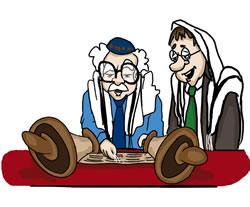
Torah Readings:
At this point two Torahs are taken from the Ark. While the Ark is open, before the Torahs are removed, special prayers designed to evoke Divine mercy are silently recited.
First Day:
The birth of Isaac is the theme of the reading of the first day of Rosh Hashanah. We learn the lesson of Divine Providence and Omnipotence. Sarah, at the age of ninety, gives birth to Isaac, her first and only child. Isaac is entered into the Covenant of our Father Abraham at the age of eight days. In the haftorah we read about the birth of the prophet Samuel.
Second Day:
The "Binding of Isaac" is the theme of today's reading. The Binding of Isaac has come to represent the ultimate in the Jew's devotion to G-d. On Rosh Hashanah, when the world trembles in judgment before G-d, we evoke the Binding of Isaac. We tell G-d, "If we have no other merit, remember how the first Jew bound all succeeding generations of Jews in a covenant of self-sacrifice to You." The haftorah, a reading from the Book of Jeremiah, talks about G‑d's everlasting love for His people and the future ingathering of the exile. In the last verse of the haftorah, G-d says, "Is Ephraim [i.e., the Children of Israel] not My beloved son? Is he not a precious child that whenever I speak of him I recall him even more?" This follows one of the primary themes of the Rosh Hashanah prayers, our attempt to induce G-d to remember us in a positive light on this Day of Judgment.
Shofar Blowing:
The shofar blowing is the central point of the days' services. Preparatory Psalms are recited, and then the shofar blower recites the blessings and sounds the shofar.
Musaf:
In most communities, The Musaf service is prefaced by a passage recited by the chazzan, wherein he requests Divine favor and permission to lead the congregation despite his deficiencies. The Special Rosh Hashanah Musaf Amidah is then recited. The Musaf Amidah has three themes -- each contained within its own blessing: G-d's kingship, G-d's remembering His people, and the sounds of the shofar. In many communities, the shofar is sounded after the congregation silently concludes each of these blessings. The chazzan then repeats the Amidah, which is again inter-sprinkled with various hymns. A deeply moving section of the Musaf Amidah Repetition is "U'nit-a-neh Tokef" (click here for the history behind this prayer). The shofar is again sounded when the chazzan concludes each of the three aforementioned themed blessings. Towards the end of the service, the priests, or kohanim, direct descendants of Aaron the High Priest, bless the congregation with the Priestly Blessing. The prayer concludes with the Ein Ke'eloheinu and Aleinu.
Afternoon Prayer:
The brief afternoon service consists of the opening prayers, the Amidah prayer, the chazzan's repetition of the Amidah, the recital of Avinu Malkenu, and the concluding Aleinu prayer.
Click here to find a service near you
Ten Days of Repentance
Seek G-d when He is to be found, call out to Him when He is near--Isaiah 55:6.
This teaches us that there are times when G-d is to be found and times when G-d is not to be found, times when He is near and times when He is not near. When is He to be found and near? In the ten days between Rosh Hashanah and Yom Kippur--The Sages.
Although repentance and prayer are always appropriate, they are especially appropriate in the ten days between Rosh Hashanah and Yom Kippur, and are immediately accepted.
During these days, additional prayers are recited and some wording in the Amidah is modified, and we are especially careful in fulfilling mitzvot. In some communities special selichot (penitential prayers) are said before dawn.
It is fitting for a person to increase his study of Torah and practice of charity during these days. People who are eager to perform mitzvot make a point of buying an especially beautiful etrog early, during these ten days.
Shabbat Shuvah
The Shabbat between Rosh Hashanah and Yom Kippur is called Shabbat Shuvah, "Shabbat of Return," because its special haftorah reading begins with the words Shuvah Yisrael, "Return O Israel." It is also referred to as Shabbat Shuvah because it falls during the Ten Days of Repentance.
Fast of Gedaliah
On Wednesday, September 19, 2012 (the 3rd of Tishrei), all men and women over the age of bar/bat mitzvah fast from dawn until nightfall, in commemoration of the assassination of Gedaliah, governor of Judea. See Today in Jewish History for more about Gedaliah. Click here for fast beginning and end times in your location.
- Pregnant and nursing women do not have to fast on this day. Someone who is ill should consult a rabbi.
- During the morning prayers we recite Selichot (elegies).
- The Torah is read during the morning and afternoon prayers (Exodus 32:11-14; 34:1-10). After the Minchah (afternoon) Torah reading, a special fast-day Haftorah is read (Isaiah 55:6-56:8).
- During the Amidah of the Mincha prayer, all those who are fasting add a small section, the Aneinu, to the Shema Koleinu blessing.
Useful Rosh Hashanah Links:
Rosh Hashanah Mega-Site
Global Rosh Hashanah Service & Event Finder
Holiday Study & Insights
Rosh Hashanah Stories
High Holiday Shopping
Rosh Hashanah Kids' Zone
Traditional Rosh Hashanah Recipes
Rosh Hashanah Audio Classes, Videos & Songs
High Holidays E-Greeting Cards